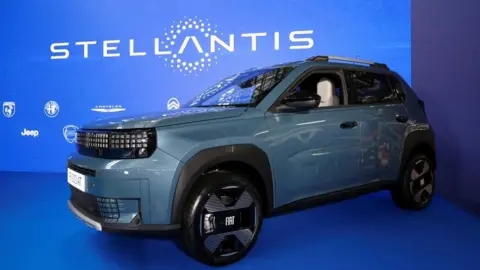In a recent declaration, the automaker Stellantis, which owns a diverse portfolio of car brands including Vauxhall, Jeep, and Fiat, has reported substantial financial losses attributed to US tariffs imposed under former President Donald Trump’s administration. The company announced that these tariffs have cost them an estimated €300 million, or approximately £259.6 million, equating to around $349.2 million. The impact of these tariffs is particularly significant, as it hinders trade dynamics and interrupts Stellantis’s planned production schedules.
The 25% tariff on imported vehicles to the United States has been in effect since April of this year, leading to widespread repercussions throughout the automotive industry. This policy has not only affected Stellantis but has also created challenges for other manufacturers. For example, Jaguar Land Rover (JLR) was forced to temporarily halt its exports to the US, signaling that the tariffs are reshaping the global car trade and impacting supply chains. The tariffs have created an unpredictable environment where many manufacturers struggle to maintain their market positions.
Stellantis, which encompasses 14 car brands, including Alfa Romeo, Maserati, Chrysler, and Dodge, has seen a marked decline in their shipments to North America. Reports indicate that shipments dropped by 25% during the second quarter of 2025 compared to the same period in the previous year, an effect that can be partially attributed to the tariffs. Furthermore, the company experienced a 10% decrease in total sales over the same timeframe, as indicated by preliminary figures from the first half of the year.
While Stellantis operates manufacturing plants within the United States, it also has facilities in the UK, Europe, Canada, Mexico, and South America. This international presence attempts to mitigate risks from tariff fluctuations; however, the ongoing challenges have resulted in Stellantis forecasting a total revenue of €74.3 billion for the first half of the year, alongside a projected net loss of €2.3 billion that directly incorporates the ramifications of the tariffs.
When introducing these tariffs, Trump conveyed that they were aimed at bolstering the American automotive manufacturing sector. However, shortly after the implementation, he modified the tariff structure, easing tariffs on foreign car parts to alleviate the burdens on domestic manufacturers. In May, a bilateral trade agreement was struck between the United Kingdom and the White House that cut tariffs to 10% for a limited quantity of vehicles. This reduction, while better than the prior tariff of 2.5%, still poses challenges for trade.
Negotiations are ongoing between the United States and various other countries regarding tariff regulations. Trump has taken a hard stance, threatening to impose increased tariffs on countries within the European Union and Mexico if they retaliate against the US tariffs. Additionally, there have been aggressive responses toward Brazil, with potential tariffs on Brazilian exports poised to reach 50% unless the country resolves specific diplomatic concerns concerning former president Jair Bolsonaro.
Stellantis is not an isolated case dealing with the fallout from these tariffs; JLR faced its own share of challenges, revising its profit forecasts downward after halting all US exports in April, before partially resuming shipments in May as a result of the UK-US agreement. To manage ongoing pressures, JLR also announced it would reduce its workforce by up to 500 management positions in the UK due to the continued adverse impact on sales stemming from the tariffs.
Overall, the landscape for automakers has become increasingly turbulent due to the imposition of tariffs, with Stellantis exemplifying the broader struggles facing the automotive industry in adapting to changing trade policies that threaten their operational viability and market stability.











